Assange, Potential Enemy of the State, Speaks to U.N.
Speaking from the Ecuadorean Embassy in London, a weary Julian Assange denounced the Obama administration for exploiting the Arab Spring for political gain during an address to the United Nations via video link on Wednesday morning. Guardian columnist Glenn Greenwald and attorney Michael Ratner comment.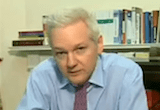
Speaking from the Ecuadorean Embassy in London, a weary Julian Assange denounced the Obama administration for exploiting the Arab Spring for political gain during an address to the United Nations via video link on Wednesday morning.
Assange borrowed a token from the title of President Obama’s 2006 best-seller, “The Audacity of Hope,” an Oprah Winfrey favorite in which the then-candidate prepared the rhetorical ground for many of the issues that would become central to his campaign. Assange identified what he considers one of the true “audacities” of Obama’s career: the willingness to claim responsibility for the modest triumphs of revolutionary democracy around the world after supporting the very leaders those uprisings sought to topple.
Mohamed Bouazizi, the Tunisian street vendor whose suicide in January 2011 sparked his nation’s revolt, “did not set himself on fire so that Barack Obama could get re-elected,” Assange said.
To the contrary, the Obama administration has done everything it can to protect the enemies of democracy and government transparency. Recently declassified Air Force records detail the investigation of an analyst who expressed support for WikiLeaks and its founder Assange. The inquiry was closed when it found no evidence that the analyst had leaked classified material, but the documents reveal that Assange may have been designated an enemy of the United States — the same status as the Taliban and al-Qaida — as the analyst was under investigation for the crime of “Communicating With the Enemy.”
That crime carries a potential death penalty, and its inclusion in an investigation into contact with WikiLeaks suggests that the government now views anyone who publishes classified material that could be seen by anyone considered an enemy as an enemy themselves. The list of candidates for enemy status extends far beyond Assange. Any media outlet, including The New York Times, which has published far more sensitive secrets than WikiLeaks, would become a potential enemy of the state. Glenn Greenwald explains:
It seems clear that the US military now deems any leaks of classified information to constitute the capital offense of “aiding the enemy” or “communicating with the enemy” even if no information is passed directly to the “enemy” and there is no intent to aid or communicate with them. Merely informing the public about classified government activities now constitutes this capital crime because it “indirectly” informs the enemy.
The implications of this theory are as obvious as they are disturbing. If someone can be charged with “aiding” or “communicating with the enemy” by virtue of leaking to WikiLeaks, then why wouldn’t that same crime be committed by someone leaking classified information to any outlet: the New York Times, the Guardian, ABC News or anyone else? In other words, does this theory not inevitably and necessarily make all leaking of all classified information – whether to WikiLeaks or any media outlet – a capital offense: treason or a related crime?
Michael Ratner, legal adviser to Assange and WikiLeaks and president emeritus of the Center for Constitutional Rights, comments further below.
— Posted by Alexander Reed Kelly.
Democracy Now!:
Your support matters…Independent journalism is under threat and overshadowed by heavily funded mainstream media.
You can help level the playing field. Become a member.
Your tax-deductible contribution keeps us digging beneath the headlines to give you thought-provoking, investigative reporting and analysis that unearths what's really happening- without compromise.
Give today to support our courageous, independent journalists.
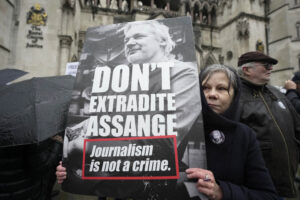
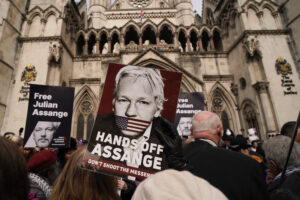
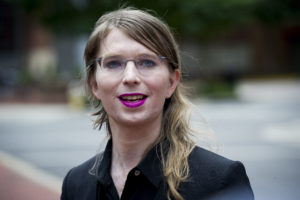
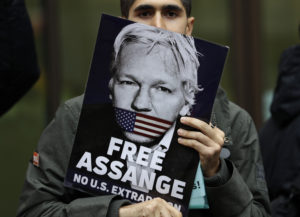
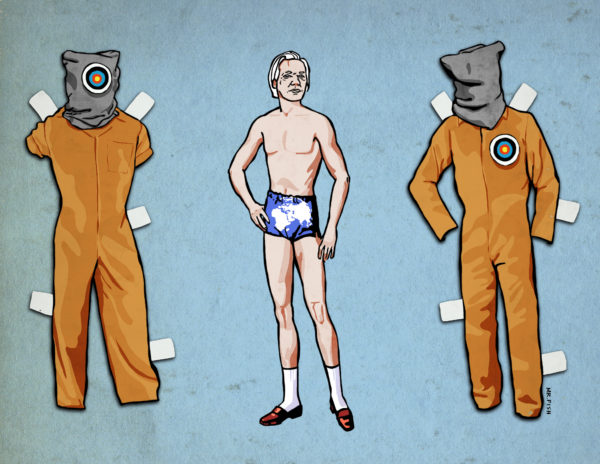
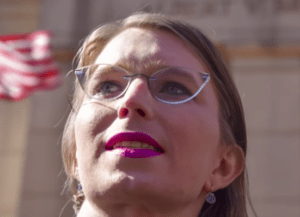
You need to be a supporter to comment.
There are currently no responses to this article.
Be the first to respond.